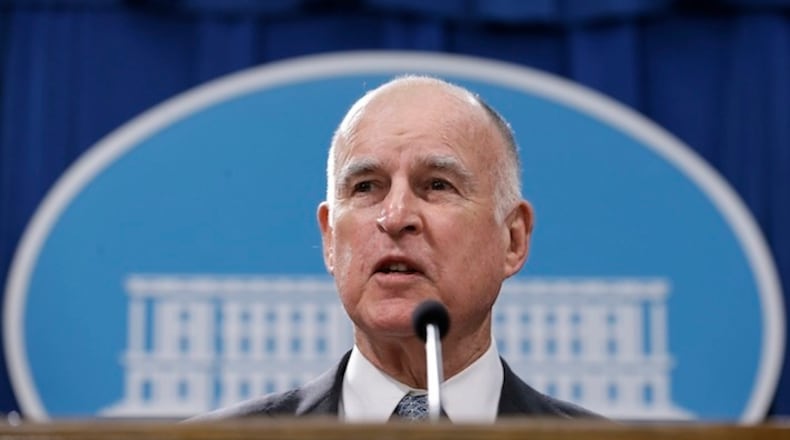Californians may decisively disapprove of President Donald Trump's performance so far, but a new online poll suggests voters here aren't so comfortable with the Golden State carrying the mantle of the "Resistance" — let alone splitting from the rest of the country.
A majority of the state's voters — including nearly one in three Democrats — would prefer cooperation over a prolonged fight with Washington that could possibly result in funding cuts or other "negative consequences," according to a new poll released Tuesday by the University of California, Berkeley's Institute of Governmental Studies.
The survey highlighted another moderate view that has weathered a time of political extremes: Californians of every political stripe oppose the idea of California becoming its own nation.
"Even Democrats won't go that far as to wanting to secede from the country," said the poll's director, Mark DiCamillo.
The poll found that 56 percent of Democrats, 85 percent of Republicans and 71 percent of independents are opposed to a "Calexit."
But in deep blue California, that's about the only thing a majority of Democrats and Republicans agreed on.
Indeed, the poll's findings highlighted a gaping divide in the views of the state's Republicans and Democrats — particularly on the subject of Trump, who received an approval rating of just 39 percent.
Just 10 percent of Democratic voters surveyed felt that the president would be good for California, compared to 71 percent of Republican voters. By contrast, 76 percent of Democrats surveyed felt the president would have a negative impact on the state, compared to just 10 percent of Republicans. About 14 percent of Democrats and 19 percent of Republicans didn't take either position, or felt the president would have no effect on the state.
Californians were most optimistic about how Trump's proposals would affect the state's infrastructure spending and the economy — and least optimistic about how the president's policies would affect the rights of minorities and the environment.
The poll was released shortly after Gov. Jerry Brown visited the nation's capital for the first time since Trump took office — a trip in which he both courted Republican leaders and publicly blasted the since-scuttled GOP health care plan, saying it was a "fake health care bill" that would hurt millions of people.
The governor sounded a note of optimism from his talks with Republican Majority Leader Kevin McCarthy, of Bakersfield, and other Republican leaders, telling reporters that he was trying to make inroads in GOP-controlled Washington. "I'm here to negotiate, to make friends and to advance the cause of California," he said.
Then, in an interview on NBC's "Meet the Press" on Sunday, Brown warned Washington not to "mess with California," arguing that withholding federal support from the state could have dire consequences for the nation's economy.
Not surprisingly, the IGS poll found Democrats (68 percent) were much more willing to pick a fight with the Trump administration than Republicans (8 percent) over policy battles — even if it carries risks.
"If anything, these poll numbers will further encourage Democratic politicians to fight back against the Trump administration," said Dan Schnur, a former GOP strategist who is now a lecturer in the University of Southern California's Annenberg School of Communications. "They see a very large majority of their party members want them standing firm. The average Democratic politician doesn't benefit much from doing something that most Republicans want him to do."
The poll's findings are based on an online survey of 1,000 registered voters in California conducted from March 13-20 in English and Spanish. The results have a margin of error of 3.6 percent.
Chad Mayes, the state Assembly Republican Leader, says such heated rhetoric doesn't serve anyone well and that he is focusing on the Berkeley IGS poll's findings that a majority of voters desire bipartisan cooperation.
"I don't think California should mess with Washington, D.C., or that D.C. should mess with California," Mayes said. "Let's get beyond the divisiveness. It's obvious in this Berkeley poll that that's what Californians want."
About the Author
The Latest
Featured


